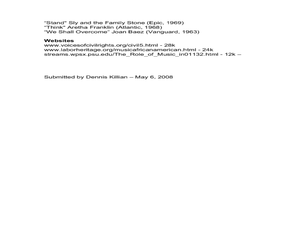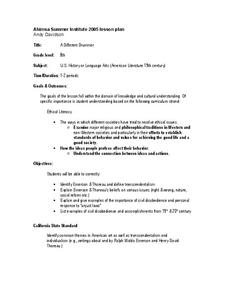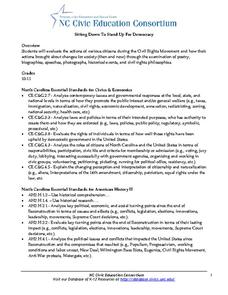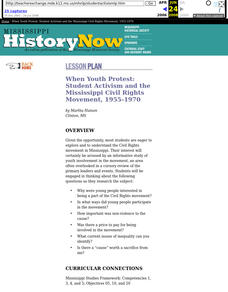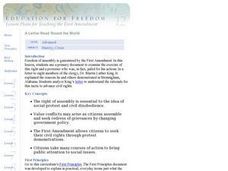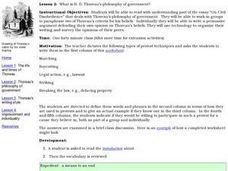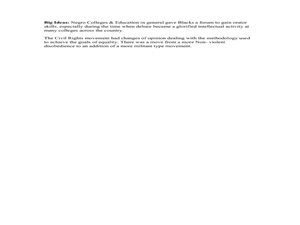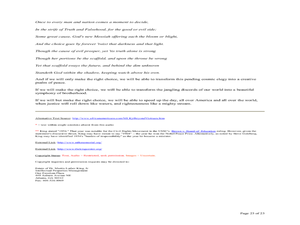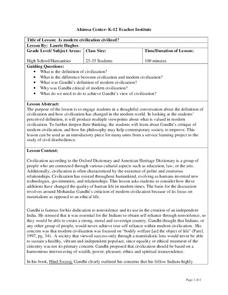Curated OER
Understanding the Music of the Civil Rights Movement
Students examine protest music and songs from the Civil Rights movement. In this music of the Civil Rights era instructional activity, students listen to selected music before working in groups to determine who the music was directed at,...
Curated OER
A Different Drummer
Eighth graders investigate philosophy and meditation techniques by discussing Emerson and Thoreau. In this philosophical traditions activity, 8th graders identify the men Ralph Waldo Emerson and Henry David Thoreau, their work, and...
Curated OER
Keep on Pushing: Popular Music and the Civil Rights Movement
High schoolers explore music that exemplified the Civil Rights Movement. In this music and history lesson plan, students research 1960's protest songs, Motown recorded music, and rap of the 1990's to consider the power of music and its...
K20 LEARN
Power to the People
Black berets, black leather jackets, raised black fists, chants of "Power to the People!" These are the images that many associate with the Black Panther Party. Often forgotten are the programs the party created during the Civil Rights...
University of North Carolina
Sitting Down To Stand Up For Democracy
Boycotts and bus rides, sit-ins and speeches. The focus of this amazing resource is on those people who were willing to put themselves at risk to take a stand for their belief in equal rights for all. A must-have for your curriculum...
Museum of Tolerance
The Price of Personal Responsibility
A reading of Patrick Henry's "Speech in the Virginia Convention," Henry David Thoreau's "Civil Disobedience," and Rev. Martin Luther King, Jr.'s "Letter from Birmingham Jail" launch a discussion about the price one is willing to pay to...
Curated OER
When Youth Protest: Student Activism and the Mississippi Civil Rights Movement, 1955-1970
Students explain the meaning of the following terms associated with the modern Civil Rights movement: segregation; integration; civil rights; civil disobedience.
Curated OER
A Letter Read 'Round the World
Learners examine primary document to examine the concept of free assembly, and analyze Dr. Martin Luther King Jr's letter to the clergy to explain the rationale for this tactic to advance civil rights.
Curated OER
The Roots of Ahimsa
Students investigate the philosophy of nonviolence. In this Ghandi lesson, students discover that Gandhi inspired many civil rights leaders with the idea of ahimsa. Students complete venn diagrams, create timelines, and discuss reading...
Curated OER
An Eye for an Eye
Pupils watch a view introducing them to modern Indian History. During the film, they answer discussion quesitons and discover the concept of non-violent civil disobedience. They share their responses with the class and write an essay to...
Curated OER
Abolitionists in U.S. History
Students read and discuss excerpts from the writings of Henry David Thoreau, Frederick Douglass and Sarah Parker Redmond. They compare and contrast the views of the three abolitionists concentrating on the experiences and reasons for...
Curated OER
H.D. Thoreau's Philosophy of Government
Students read an essay by H.D. Thoreau as analysis of his philosophy on government. In this Thoreau analysis lesson, students work in groups to paraphrase two of Thoreau's criteria for his beliefs about government. Students write a...
Curated OER
Civil Rights Methodology Martin Luther King, Jr. – Stokely Carmichael
Students compare and contrast the visions of Martin Luther King, Jr. and Stokely Carmichael. In this African-American history lesson plan, students read speeches by each of the men and summarize the arguments made by each of them about...
Curated OER
Satyagraha, Its Origins and Applications
Tenth graders study the steps and methods taken by Gandhi. In this World History lesson, 10th graders create illustrations to represent these steps. Students write a persuasive essay on these measures taken by Gandhi.
Facing History and Ourselves
The Audacity of a Vote: Susan B. Anthony’s Arrest
Susan B. Anthony's speech "Is It a Crime for Women to Vote?" takes center stage in a instructional activity that asks class members to consider how they might respond to what they consider an unjust law. Groups work through the speech...
Curated OER
Muhammad Ali and his Vietnam War Resistance: Defining Nonviolent Action through Gandhi and King
Pupils research Muhammad Ali's act of civil disobedience. In this civil disobedience lesson, students research Ali's defiance of the Vietnam War draft and compare his reasoning to Martin Luther King's thoughts on the war. Pupils debate...
Facing History and Ourselves
Life for German Youth in the 1930s: Education, Propaganda, Conformity, and Obedience
The German youth faced an onslaught of propaganda when they went to school, thanks to the Nazi regime led by Hitler during World War II. Pupils relate their education experiences to German youth by analyzing primary source readings,...
Curated OER
The Art of Nonviolence: Martin Luther King, Jr., Gandhi, and Concepts of Nonviolence in Indian Art
Young scholars make connections between nonviolent ideals and art. In this visual arts lesson, students discuss the successes of the American Civil Rights Movement and discuss Gandhi's influence on the movement. Young scholars then...
National Endowment for the Humanities
Revolution '67, Lesson 1: Protest: Why and How
To some people, protesting is as American as apple pie, but the factors that lead to protests can be as confusing to veteran activists as to today's youth. Revolution '67 explores the riots in Newark, New Jersey as a case study. Using...
National Endowment for the Humanities
Revolution '67, Lesson 2: What Happened in July 1967? How Do We Know?
Even in a world in which dozens of participants and curious onlookers record every controversial event, the basic facts of what happened are often in dispute. Revolution '67, Lesson 2 explores 1967 Newark, New Jersey using an examination...
Curated OER
Is Modern Civilization Civilized?
Students examine the concept of civility. In this modern civilization lesson, students study Gandhi's teaching about the attributes of civilized societies and discuss how they can contribute to fostering civilization in their own community.
Curated OER
CIVIL DISOBEDIENCE
Students use events of the time to illustrate the significance of the 1965 Selma-to-Montgomery Voting Rights March.
Facing History and Ourselves
Do You Take the Oath?
Why did so many go along with Nazi policies during World War II? An investigatory unit includes four handouts, reading analyses, classroom discussion topics, and intriguing philosophical questions, helping learners understand the...
Facing History and Ourselves
Laws and the National Community
When it comes to the law, is justice always served? Teach scholars about how law sometimes enables prejudice of entire groups of people with a unit on World War II that includes a warm-up activity, analysis of primary sources,...
Other popular searches
- Civil Disobedience Thoreau
- Gandhi Civil Disobedience
- On Civil Disobedience
- Thoreau's Civil Disobedience
- Civil Disobedience War
- Thoreau, Civil Disobedience
- Civil Disobedience 60s
- 1960's Civil Disobedience
- Civil Disobedience Thoreau
- Civil Disobedience, Thoreau


